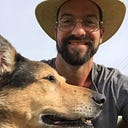Epistolution Musing №3: The Aim of Life
Dear Friends,
This letter is part of a weekly series of brief thoughts I would like to share with you, either because I’ve come across your related work in biology or because you’re a person I like. I discovered an interesting problem in 2019, a problem I can’t forget. Epistolution is the unknown biological mechanism necessary to explain purposive activity that can’t be accounted for by genetic influences.
Recap: Two weeks ago in our thought experiment with the twins Anna and Amanda we noticed that learning new functions is controlled by something other than genes. Then last week we backtracked to trace the influence of genes, and found that they provide a sort of landscape of possibility along which a cell can travel as it learns about its world. But this realization raises a major problem. If all cells can learn, then what is the aim of learning? This week we discuss the idea that the only purpose life can attend to is survival and reproduction, a view I call “selectionism,” and see if it can withstand careful scrutiny.
Natural selection is the bedrock of all explanation in biology today. It is perhaps the most well-accepted theory in all of natural science. The idea is that living beings inherit variation that gives them differential reproductive success. The winners spread their variations through the future populations producing long-term changes in populations of organisms, i.e. evolution. In biology, the saying goes that if you aren’t thinking about evolution (by natural selection,) you aren’t thinking. But are there any phenomena in biology that cannot be explained by natural selection along with random contingencies like genetic drift, the founder effect, or the (presumably accidental) origin of life? Does natural selection explain everything?
It is hard to deny that life must be compatible with survival and reproduction (S/R) or it would not persist. But S/R isn’t what organisms as agents are “thinking” about. Humans can imagine their own deaths, but I doubt that this ability extends very far through the tree of life, and anyway, even in our case it’s pure speculation. The S/R problem isn’t in the domain of the organism; it’s in the domain of the observer. Organisms cannot use it to choose between possible behaviors because they do not have any experience with survival vs. nonsurvival (death) or, in most cases, different rates of reproduction. As organisms live, they gather knowledge, but they cannot possibly be learning about what leads to or doesn’t lead to survival or reproduction; it’s outside their ken. If organisms have agency, it means that they can select their own problems to solve; Anna and Amanda prove that all the problems and solutions are not selected for them by their genes.
So how do they select the local problems that they are solving instead? For example, In Michael Levin’s lab, researchers surgically rearrange the faces of developing frog embryos, a mutilation that presumably has no evolutionary history, therefore no heritable solution. But the cells in the frog face nevertheless grow to shift the eyes and mouths back to the correct placement, and even compensate if they overcorrect. How could these cells possibly have any notion of what implications this activity has for the ultimate survival of the frog? Levin conducts another experiment where he melts the heads of planaria with barium, again a problem unknown to their evolutionary history. The planaria regrow their heads with cells that are resistant to barium. How do they discover how to do this?
There also seems to be no material in the organism that could connect the aim of survival and reproduction to the new subject matter being learned. Natural selection carries its influence through the generations, as far as we know, exclusively by influencing the error-corrected heritable materials in the cell, like genes. Surely genes do have an effect on life forms, and they are essential for life; that isn’t in dispute. But they simply can’t be in control of learning because with the same inheritance, Anna and Amanda learn different lessons. This remarkable thought makes me conclude that there must be a different aim entirely that motivates learning. As Richard Watson argues, there must be another “prime mover.”
Another paradox arises with the problem of cancer. If it were true that S/R was the only problem cells were solving, then all cells in multicellular bodies would be cancerous, looking out only for themselves. A cell could not be alive unless it attended strictly to its own S/R. Instead, somatic cells solve different local problems but support S/R on another level. This contradiction shows that it is impossible that the aim of survival and reproduction is the only organizing principle which makes cells live. In some cases, cells even kill themselves through apoptosis in order to enhance the health of the body as a whole. The same is true of colony-forming insects, like ants, and of human soldiers, for that matter. Cells are coerced into supporting the S/R of colonies, and yet they maintain their own basal cognition, so the S/R of the cell can’t be what basal cognition is all about. So again, how does the cell select what local problems it is solving?
When I take these issues in, I conclude that the only candidate for a prime mover that can apply to all the cells on earth is the aim of knowledge itself. In two weeks we will explore what this weird new view of knowledge means, but first I think it’s important to spend a little more time on framing the problem of epistolution. I have learned that for nearly all of us, the hard part is keeping the concept of epistolution in view while we reason about the consequences. The received paradigmatic ideas about life are deeply ingrained and hard to overcome, even for me. Next week we will look at some additional reasons selectionism can’t be right.
Be Kind, and Be Brave,
Love, Charlie Sent 12/20/23
